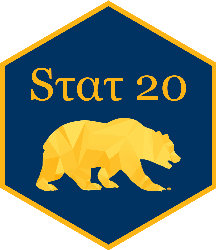15:00
Taxonomy of Data
STAT 20: Introduction to Probability and Statistics
Agenda
- Announcements
- Group Activity: Conceptual
- Worksheet 1: Taxonomy of Data
- Break
- Concept Questions: Coding
- More Practice
Assignments
You should have submitted Lab-1 UN Votes and Worksheet Packet WSP-1
These were originally due yesterday (Tue) on Gradescope by 8:00am, but got extended till 11:59pm.
You should have answered Reading Questions of Taxonomy of Data
These were due yesterday (Tue) on Gradescope by 11:59pm
Notes Recap
Concept of Data
One or more characteristics observed or measured on a set of objects.
Concept of Data
One or more characteristics observed or measured on a set of objects.
Variables: characteristics, features, attributes.
Objects: individuals, subjects, items.
Data typically organized into a data table (or data frame), ideally one row per individual, and one column per variable.
Types of Variables
Variables can be classified in different ways.
The classification (aka taxonomy) adopted in STAT 20 involves 2 major classes, each one with two subcategories:
Numerical
- Continuous
- Discrete
Categorical
- Ordinal
- Nominal
Group Activity
As a group, choose a set of individuals, and list at least:
- 3 continuous numerical variables
- 3 discrete numerical variables
- 3 ordinal categorical variables
- 3 nominal categorical variables. Don’t choose:
❌ Do Not choose:
- students
- electronic devices
Worksheet 1: Taxonomy of Data
https://stat20.berkeley.edu/fall-2025/assignments.html
20:00
Break
05:00
Practice Problems
Additional handout prepared for Prof. Sanchez’s sections (1 & 8)
These are NOT worksheets (no need to submit to Gradescope)
25:00
Your Turn
Create a vector named
vecwith the even integers between 1 and 10 as well as the number 99 (six elements total).Find the sum of that vector.
Find the max of that vector.
Take the mean of that vector and round it to the nearest integer.
These should all be solved with R code. If you don’t know the name of a function to use, you could hazard a guess by looking for a help file (e.g. ?sum) or google it.
05:00
Your Turn
Create a new .qmd file, name it, and save it.
Insert a new code cell.
Create three vectors,
name,hometown, andsibs_and_petsthat contain observations on those variables from 6 people in this class.
Combine them into a data frame called my_classmates.
06:00
Reminder
Answer Reading Questions of Summarizing Categorical Data
Due on Gradescope by 11:59pm Thursday
